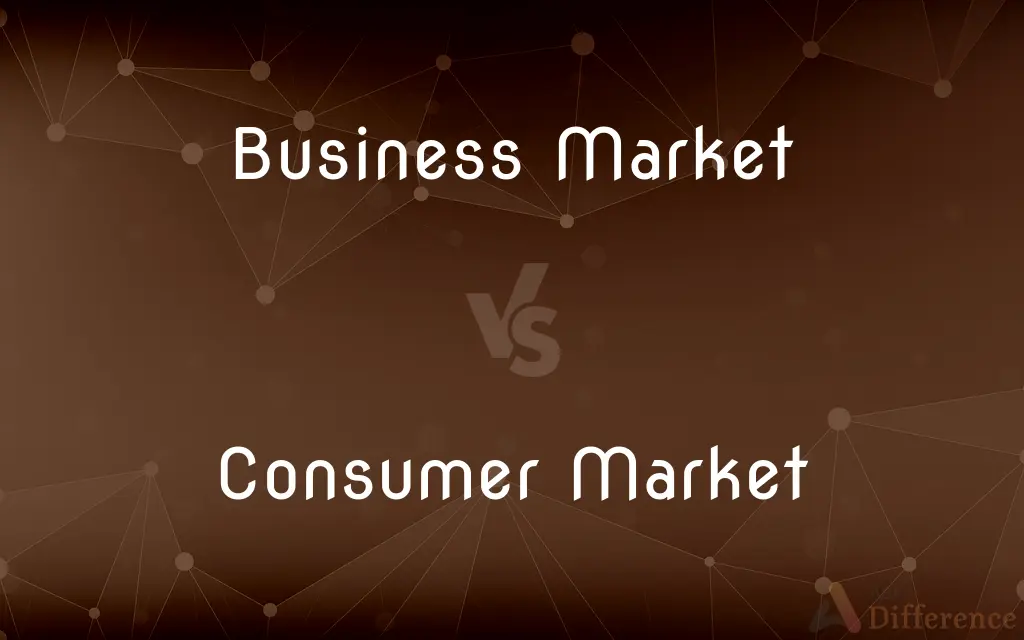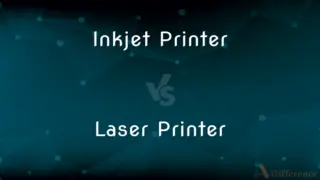Business Market vs. Consumer Market — What's the Difference?
By Tayyaba Rehman — Published on November 4, 2023
Business Market involves transactions of goods/services between businesses. Consumer Market involves selling goods/services directly to end consumers.

Difference Between Business Market and Consumer Market
Table of Contents
ADVERTISEMENT
Key Differences
In the Business Market, transactions are often bulk and involve more extended negotiation processes. The primary aim of companies within this sphere is to purchase products or services either for operational purposes or for reprocessing and then selling to the Consumer Market. On the other hand, the Consumer Market primarily targets individual buyers who consume the goods and do not resell them. Businesses in this market typically focus on meeting the demands, preferences, and needs of individual consumers, ensuring that their product or service is accessible, usable, and purchasable by their target audience.
In terms of the buying process, the Business Market typically involves more complex and lengthy transactions due to larger quantities and higher costs of goods/services. On the contrary, the Consumer Market generally experiences simpler, more straightforward transactions, often driven by personal need or desire rather than strategic planning or resale purposes.
The Business Market often entails a relationship-oriented transaction where negotiations, contracts, and often, a longer-term relationship develops between the buying and selling organizations. In the Consumer Market, purchasing is often transactional and might not always promote a lasting relationship between the buyer and the seller, as the purchase often fulfills an immediate need or want.
Moreover, the Business Market usually deals with fewer, larger transactions. It is often characterized by a smaller customer base with more significant transactions. In contrast, the Consumer Market deals with a larger customer base, and transactions are typically smaller in volume and financial value.
Advertising and promotion in the Business Market are often direct and focused on the specific needs and specifications of the businesses being targeted. Whereas in the Consumer Market, advertising tends to be broader and aims to appeal to the emotions, perceptions, and preferences of the general public or specific consumer segments.
ADVERTISEMENT
Comparison Chart
Main Objective
B2B transactions, resale
B2C transactions, final use
Transaction Size & Type
Larger, often negotiated
Smaller, straightforward
Buying Process
Complex and structured
Simpler, often impulsive
Relationship Importance
Often long-term and strategic
Can be transactional
Marketing Approach
Direct, detailed, and specific
Broad, emotion-driven
Compare with Definitions
Business Market
In the Business Market, dealings are often negotiated due to high-volume and high-cost transactions.
In the Business Market, companies often form strategic alliances to benefit mutually.
Consumer Market
Transactions in the Consumer Market are typically simpler and may be impulsive or need-based.
Black Friday sales cater to the impulsive buying nature prevalent in the Consumer Market.
Business Market
Business Market pertains to transactions between businesses typically involving bulk purchases.
The car manufacturer explored the Business Market to source durable tires.
Consumer Market
The Consumer Market is characterized by numerous transactions, often of smaller financial value.
E-commerce platforms in the Consumer Market facilitate countless small-value transactions daily.
Business Market
Business Market transactions generally involve goods/services intended for resale or production processes.
The textile firm explored the Business Market to obtain quality raw materials.
Consumer Market
The Consumer Market encompasses businesses selling goods/services directly to the end-user for usage.
The apparel store launched a new collection targeting the youth segment of the Consumer Market.
Business Market
The Business Market often demands a relationship-centric and structured transaction approach.
Establishing trust is paramount for operators within the Business Market.
Consumer Market
In the Consumer Market, goods are sold for personal use and not typically for resale.
Supermarkets offer a wide range of products designed for the diverse needs of the Consumer Market.
Business Market
Marketing in the Business Market is usually precise, focusing on specific needs and features.
Detailed specifications of machinery are critical in Business Market advertisements.
Consumer Market
Advertising in the Consumer Market often aims to appeal emotionally and broadly to a vast audience.
Creating relatable advertisements is crucial for brands targeting the Consumer Market.
Common Curiosities
What types of goods are typically exchanged in the Business Market?
Goods exchanged in the Business Market are usually meant for resale or use in production, such as raw materials, machinery, and wholesale products.
How is the Consumer Market characterized in terms of purchasing?
The Consumer Market typically involves purchases by end-users for personal use, often guided by individual needs, wants, or impulses.
How do relationships between entities differ in the Business Market compared to the Consumer Market?
In the Business Market, relationships are often long-term and strategic, while in the Consumer Market, relationships may be more transactional and short-term.
What is the main objective of the Business Market?
The main objective of the Business Market is to engage in transactions of goods and services between businesses, often for resale or production purposes.
How does marketing differ between the Business Market and Consumer Market?
Marketing in the Business Market is typically direct and feature-focused, while in the Consumer Market, it is broader and aims to emotionally engage a wide audience.
How does the size and nature of transactions contrast between the Business Market and Consumer Market?
The Business Market usually involves fewer, larger, and often negotiated transactions, whereas the Consumer Market tends to involve a higher volume of smaller, straightforward purchases.
What is an example of a product in the Business Market?
Industrial machinery used in manufacturing processes is a common product in the Business Market.
Can a business operate in both the Business Market and Consumer Market simultaneously?
Yes, a business can operate in both markets, offering products/services to other businesses and direct consumers, often known as a B2B2C model.
How is demand generated in the Business Market compared to the Consumer Market?
Business Market demand is often derived from the demand in the Consumer Market, whereas demand in the Consumer Market originates from the end consumers’ needs and wants.
What is a key characteristic of transactions in the Consumer Market?
Transactions in the Consumer Market are usually smaller in financial value, more numerous, and often simpler compared to the Business Market.
How does pricing strategy typically differ between the Business Market and the Consumer Market?
In the Business Market, pricing is often negotiable and subject to contract agreements, whereas in the Consumer Market, pricing is usually fixed and displayed on products.
Which market typically has a larger customer base: Business Market or Consumer Market?
The Consumer Market usually has a larger customer base, encompassing various individual consumers with varied purchasing behaviors.
Why might a product’s lifecycle be different in the Business Market compared to the Consumer Market?
Products in the Business Market might have a longer lifecycle due to the durable and capital-intensive nature of goods, while in the Consumer Market, products may have a shorter lifecycle due to rapidly changing consumer preferences.
What role does branding play in the Business Market and Consumer Market?
In the Consumer Market, branding plays a pivotal role in differentiating products and influencing purchasing decisions. In the Business Market, while branding is essential, purchase decisions might be more influenced by factors like functionality, reliability, and partnerships.
How does distribution differ between the Business Market and Consumer Market?
In the Business Market, distribution may involve direct sales or specialized distributors, while the Consumer Market might utilize various channels, including retailers, e-commerce platforms, and direct-to-consumer channels.
Share Your Discovery

Previous Comparison
Inkjet Printer vs. Laser Printer
Next Comparison
Realism vs. Abstract ArtAuthor Spotlight
Written by
Tayyaba RehmanTayyaba Rehman is a distinguished writer, currently serving as a primary contributor to askdifference.com. As a researcher in semantics and etymology, Tayyaba's passion for the complexity of languages and their distinctions has found a perfect home on the platform. Tayyaba delves into the intricacies of language, distinguishing between commonly confused words and phrases, thereby providing clarity for readers worldwide.












































